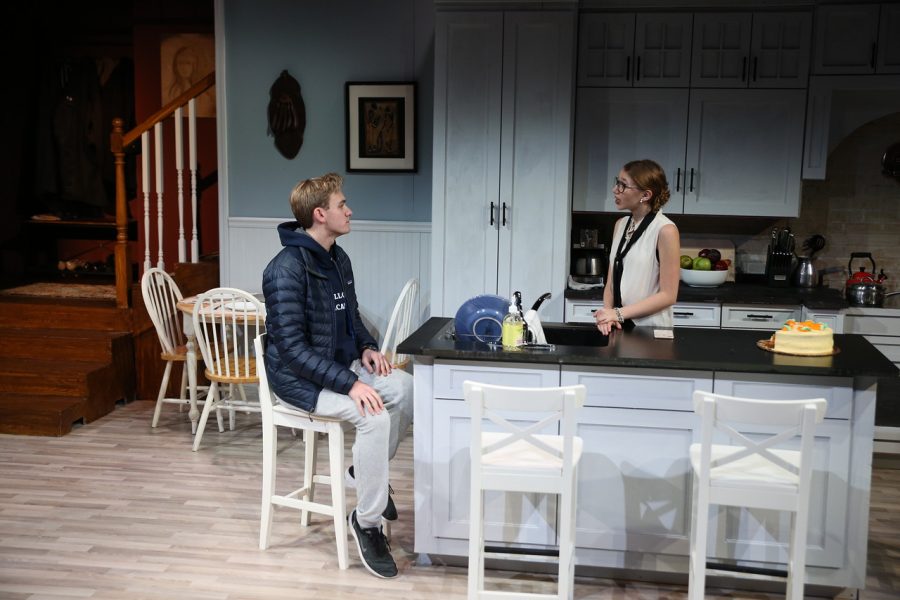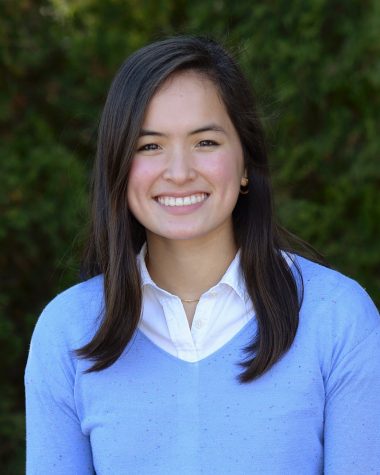Maybe We Don’t Always Need Answers: Reflecting on ‘Admissions’
Henry Jodka ’20 and Leila Pearson ’21
December 12, 2019
On Thursday, November 7, all juniors and seniors attended the SLS Theatre production of Joshua Harmon’s ‘Admissions: The Play.’ The performance was not just the culmination of the cast’s hard work, but a milestone: it was the high school premiere of ‘Admissions,’ as St. Luke’s is the first school in the country to attain the rights to the show. Most importantly, the show presented challenging questions that have the potential to spark conversations and change.
‘Admissions’ tells the story of Sherri Rosen-Mason, the white, progressive dean of admissions at Hillcrest Academy, a prestigious New Hampshire boarding school. She dedicates herself to increasing student diversity at Hillcrest, but her commitment to social justice is challenged when her son, Charlie, is deferred from Yale while his biracial best friend, Perry, is accepted. Charlie and Perry have nearly identical transcripts and resumés, leading the Masons to suspect that Perry was the beneficiary of affirmative action.
I’ll admit it: I wasn’t really looking forward to attending the show. I love theater, but I wasn’t enchanted by the idea of losing my free period and sitting in a folding chair for two hours. But as soon as ‘Admissions’ started, it was clear that the show was going to be a truly fascinating and thought-provoking production.
Connor Rosow’s lighting design and Mr. Conners’s detailed set brought the Masons’ home to life, and the “techies” helped run a seamless show. Each actor’s performance was captivating, from Allie Vogel’s kindhearted but ignorant Roberta to Henry Jodka’s distraught Charlie. Leila Pearson carried the show as Sherri – she never left the stage and delivered her (many!) lines with sensitivity and heart. Emily Stute, Adrian Antonioli, and Cameron Tyler offered brilliant performances and raised some of the most poignant messages of the show.
‘Admissions’ resonated with its audience of juniors and seniors not only because of the outstanding performances, but because of its provocative script. The show revolved around the college process, which constantly looms in the back of our minds. Thus, we could empathize with the distress and anxiety of Charlie’s admissions results. Beyond the connection between the audience and the actors, ‘Admissions’ was relevant to each of us as its sensitive subject matter directly addressed the controversies we will face throughout the college application process.
Director of Theatre Arts Jason Peck prefaced the show by acknowledging that it was “a show with something say” and had “the potential to offend people.” But Peck emphasized that ‘Admissions’ was produced not to advance an agenda, but rather to start conversations. He encouraged viewers to “be in the questions,” meaning the goal of the production was to raise more questions instead of attempting to answer them.
As I watched ‘Admissions,’ dozens of questions came to mind, and they remain with me even a month after the production. These questions force me to rethink my opinions on controversial subjects like race and affirmative action, and have helped prompt dialogue, not just between my friends and me, but in the broader St. Luke’s community.
No moment of ‘Admissions’ was more intriguing than Charlie’s nearly six-minute monologue. After being deferred from Yale, Charlie complains that his classmates are given a boost in the admissions process thanks to the color of their skin. He laments the ambiguities of racial identity, asking who decides “why a white lady with Spanish blood who lives in Spain is white; but a white lady with Spanish blood who lives in Argentina is not white.” This moment raised a highly complicated question — if important decisions like college admissions can take race into consideration, don’t we first need to agree on what race really is?
After all, race can have both a personal and societal definition. For example, biracial students like Perry fall into multiple racial categories, yet they might self-identify as just one race. So at what point does a societal definition override one’s personal identity?
Near the end of the show, yet another uncertainty surfaced in my mind. To his parents’ horror, Charlie decides to withdraw his applications to prestigious universities like Middlebury and instead plans to attend community college. He implores his parents to use his tuition to create a scholarship for a minority student to attend Hillcrest.
At first, this choice seemed outlandish. But upon deeper thought, I realized Charlie’s decision was really hyperbole of a real phenomenon: the feeling that in order to truly impact a social issue, you have to “play your part.” His choice prompted a particularly challenging question of the show: what does it really mean to “play your part” in activism? Do we have to abandon our own ambitions to show true dedication to a cause?
Charlie argues that activists should do exactly that. He shouts, “I don’t want to blindly climb my way to the top, pretend everything’s gonna take care of itself while I get as far as I possibly can, and then burn the staircase behind me and try to make a difference over there, down there, in some area that doesn’t affect me at all.” In other words, he is arguing that it is irrational for one to protest a system’s flaws from a place of power awarded to them by those same injustices.
In my mind, this position represents the conflict between passive and active change. A Middlebury education would surely give Charlie greater opportunity to effect change than if he had attended a community college, but refusing admission could create a spot at Middlebury for an underrepresented student. However, there is no guarantee that Charlie’s choice would actually yield this result. Therefore, the decision to attend a prestigious university is a more definitive way for Charlie to actively use his education for social good.
Finally, one of the most personal questions that ‘Admissions’ evoked was stirred by a Q&A which followed the show.
After the actors took their bows, Director of College Counseling Sonia Bell led a panel with Ali Michael, the co-founder and director of the Race Institute for K-12 Educators. While speaking with Michael, Ms. Bell shared that racism can often seem like a distant problem, as if it only affects people outside of the St. Luke’s community. However, she observed that race becomes a prevalent reality during the college process, and revealed that countless seniors have asked her whether they should acknowledge their ethnicity on their applications.
I admit that this doubt has often crossed my mind. I fear that in light of recent alleged quotas placed on Asian admission, my heritage will somehow endanger my chances of acceptance.
This fear echoes one of the show’s central themes, as a common argument in the college conversation is that admissions should not be a pure meritocracy. Rather, admissions officers should take certain skills or characteristics into account in order to build a diverse class.
My first instinct is that achievement should override subjective traits, but I understand the need for diversity on college campuses. After all, students’ life experiences give them unique perspectives, which only enrich universities’ communities and learning environments. However, I wonder about the limitations on this ideal. At a certain point, does a highly accomplished student “deserve” to attend a renowned academic institution more than a less-qualified person who has overcome obstacles in life? And what do universities deem to be a true obstacle?
While pondering these questions, I came far from reaching conclusions, and it’s likely that we as a society will never find concrete answers. But maybe that’s okay. Because the value of these discussions — and of shows like ‘Admissions’ — is to challenge us to reexamine our beliefs and see issues from more than one point of view.
Soon, this challenge will extend to communities outside of St. Luke’s: ‘Admissions’ received such rave reviews that the Greenwich Theatre Company has partnered with SLS to produce the play at the Greenwich Teen Center. The St. Luke’s cast will perform the show on December 12 and 13 at 8pm, and all St. Luke’s community members are encouraged to attend and support our SLS cast and crew.
Whether or not you attend the show, I urge you to keep these questions in mind. If we do, then when we inevitably encounter conflict on the Hilltop and beyond, we can listen to our peers and learn from their perspectives by “being in the questions.”





thomasa23 • Dec 17, 2019 at 8:25 am
Amazing article!
adviser • Dec 16, 2019 at 2:14 pm
Great article, Elyse!